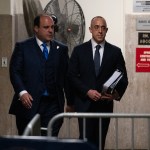With the Pentagon’s inspector general set to arrive in Iraq in a few weeks to personally investigate allegations of corruption in, among other places, the training of Iraqi security forces, it’s worth remembering that suspicions of wrongdoing in the command led one officer to take his own life out of apparent shame. In a suicide note left on his bed in Baghdad, Lt. Colonel Ted Westhusing wrote, “I didn’t volunteer to support corrupt, money grubbing contractors, nor work for commanders only interested in themselves.” Westhusing, 44, killed himself on June 5, 2005.
Much about Westhusing’s case remains a mystery. According to a definitive Los Angeles Times exploration of his death published in November 2005, the committed Christian and West Point graduate began working for the training command, known as MNTSC-I, in January of 2005. General David Petraeus, who now leads U.S. forces in Iraq, commanded MNTSC-I in 2004 and 2005. Westhusing’s primary responsibility was to oversee a private company, USIS, which held a $79 million contract to train Iraqi special forces, and Petraeus told him he had exceeded “lofty expectations.”
In May, however, someone — apparently a USIS contractor — slipped him an anonymous four-page letter contending widespread corruption within the company and the command. Journalist Robert Bryce obtained the letter (pdf) earlier this year for a piece in the Texas Observer:
Recently I was told that USIS… is only missing 4 weapons. Now, we just spent the last 9 months with almost 200 weapons missing so I wondered how we went from 200 to 4. The missing weapons are common knowledge within the camp and no one seems to be trying to hide it. The take on it is that the Iraqis are stealing them and it is not our problem. This is not true. A lot of weapons were signed out by instructors and never returned. …
Our Log guys have lost total control over what is issued. If you try to match up what USIS is charging the government, the inventory on camp and what has been issued to Iraqis it will not even be close.
The provenance of the letter is unknown, and it alleged even more serious charges — including contractor murder of Iraqi civilians. Westhusing initially wrote to a commander, Major General Joseph Fil, that USIS was “complying” with the terms of its contract, and that the “evidence suggests the other allegations are not true as well” barely a week before his death. Investigators came to much the same conclusion, though questions about missing weapons were recently corroborated by a Government Accountability Office report disclosing that MNSTC-I lost nearly 200,000 rifles and pistols during 2004 and 2005.
Westhusing — who friends describe as having fallen victim to depression that spring — somehow came to believe the claims to be substantiated, perhaps out of a general sense of despair in his mission. He began to make ominous statements about his fate to family members. His wife later told (pdf) Army investigators that Westhusing told her, “The contractors are corrupt, the Iraqi [sic] were untrustworthy.”
On June 5, at a USIS meeting at the military complex surrounding Baghdad International Airport, Westhusing expressed anger at construction delays, funding shortfalls and delays in training Iraqis. He excused himself during a noontime break. When a colleague went looking for him, he found Westhusing face-down on the floor in a pool of blood. There was gunpowder residue on his hands; after a three-month investigation, Westhusing’s death was ruled a suicide.
Investigators discovered a note in his trailer that “lashed out” at Petraeus and Fil, and ended, “I came to serve honorably and feel dishonored. Death before being dishonored any more.”
Now, another MNSTC-I official, an Air Force lieutenant colonel named Levonda Joey Selph, faces questioning by criminal investigators for unspecified wrongdoing. Recent government reports have hinted at serious problems with the command’s contracting process, leading Lieutenant General Claude “Mick” Kicklighter, the Pentagon inspector general, to travel to Iraq in the coming weeks to helm a broad anti-corruption investigation. Whether it can rectify the problems Colonel Westhusing came to believe exist throughout the contracting process in Iraq remains to be seen. But hopefully it will bring a sense of closure to his wife, Michelle, who said in a sworn statement to Army investigators, “I think Ted gave his life to let everyone know what was going on.”





 Officer’s 2005 Suicide A Painful Reminder of Corruption in Iraq
Officer’s 2005 Suicide A Painful Reminder of Corruption in Iraq


